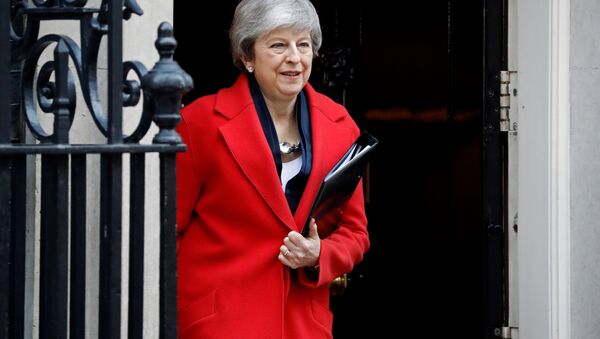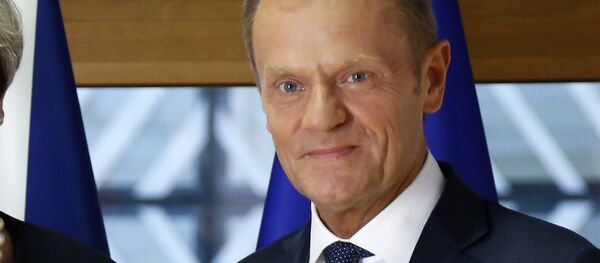Sputnik has discussed this with Professor Federico Fabbrini, director of the Dublin City University Brexit Institute and professor of European law at the DCU School of Law and Government.
Sputnik: I was going to begin by asking you just one question, but it sounds like a line from a song almost – where is Brexit now? Yes, where is Brexit now? How likely is the European Union to grant Brexit a delay?
Federico Fabbrini: Well, Brexit is at a critical phase and we are still in the middle of very uncertain times. I think a lot will depend on what happens in the next couple of days at the European Council meeting in Brussels. As we heard, it is likely that UK Prime Minister Theresa May will seek an extension of UK membership in the European Union, but we don’t know, really, what the European Council is going to say about it. I think a lot will depend on what type of extension the United Kingdom will be looking for. It could be a short technical extension that ends before the European Parliament election; and that would certainly be a no-brainer for the EU side, but it’s also quite uncertain what could be the added value of prolonging membership for just three months. Or it could be a much longer extension, some people talk about two years if not more; that would certainly provide more time for the United Kingdom to reconsider its stance on Brexit. But such a long extension would, indeed, create quite a bit of complications for the European Union, because in May there are European Parliament elections and, frankly speaking, it’s very hard to see how having a vote for this election in the UK would not turn out into a very problematic event.
READ MORE: Short Extension of Brexit Depends on MPs' 'Positive Vote' — Donald Tusk (VIDEO)
Sputnik: There were certainly a lot of rumours these past few days regarding how prolonged this delay could be; but now, more reports are actually saying that most likely there will be a short delay. Do you think that is the likely outcome?
Sputnik: It’s interesting that European Commission President Jean-Claude Junker said that it was unlikely that the European Union would reach any decision on the demand at the two-day gathering without a clear signal from London. So they might not really even decide?
Federico Fabbrini: It is possible that there will not be a decision this week. In fact, in any case, the European Council will only act after receiving a formal request by the British government. And as of now, we haven’t seen yet what the intention of Prime Minister Theresa May is. Of course, there is time for, potentially, an extra summit, a special summit meeting next week, just before 29 March. Also, of course, the European Council could decide through a written procedure whether to accord an extension. Clearly, the position of the European Union is a responsive one, so it is for the UK government to really take the first step and clarify what its intentions concerning the extension really are.
READ MORE: UK PM Confirms to Parl’t She Asked EU for Brexit Delay Until 30 June
Sputnik: Some observers have been saying that Theresa May’s stance as a Remainer contributed to the failed Brexit process. What would be your take on this?
Federico Fabbrini: It’s difficult to say. The division within the Conservative Party would have most likely complicated the process of withdrawal from the European Union even if the prime minister had been more of a Leaver rather than a Remainer. I would rather think that Brexit shows how complicated it is for a member state to disentangle from the European Union. The United Kingdom was not part of the Eurozone, it did not participate in the Schengen free movement zone; it had already lots of opt-outs for many EU policies; and still we see after two years of negotiations, the political and technical complexities of pulling out of the EU. In a way, Brexit is a blunder to all the Eurosceptic and sovereignty forces across Europe who had been making the case for leaving the European Union, and it just shows how difficult, in fact, it is for a country to do so. It’s not surprising that, as a result of what we’ve been witnessing with regard to the United Kingdom, calls for secession within the EU have actually gone down, since other countries which have definitely less capacities than the UK would find themselves in even more complicated waters.
Federico Fabbrini: Certainly, from a business perspective, but also from the point of view of citizens in Northern Ireland, as well as in the Republic of Ireland, an extension of Article 50 would more certainly be seen as a positive development. Things would remain as they are – free movement of goods, people, services and capital; there would not be a border of any kind between Northern Ireland and the Republic of Ireland. So, the status quo has, undoubtedly, some positive values for citizens and businesses there. But as I was saying before, the issue of the extension has a lot to do with the type of extensions we are talking about. If we are going for a simple delay of a hard Brexit, this is only going to buy a little bit more time, but preparations would have to be put in place anyway; and they are being put in place, certainly, in the Republic of Ireland through the contingency measures adopted by the European Union.
The views and opinions expressed in this article are solely those of the speaker and do not necessarily reflect Sputnik's position.



